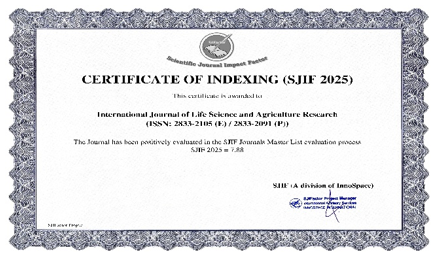Nutritional Content of Brown Rice and White Rice from Organic Rice of Mentik Susu Varieties with Parboiled Method
DOI:
https://doi.org/10.55677/ijlsar/V02I11Y2023-01Abstract
Parboiled rice is rice produced from milled dry grain (MDG) that has received cleaning, soaking, steaming, drying, and milling treatments. It is very rare that the parboiling process is done on brown rice or white rice. In this study, the parboiling process was carried out on MDG, brown rice, and white rice from the organic rice of Mentik Susu variety. The study consisted of six treatments, unparboiled brown rice, parboiled brown rice, brown rice from parboiled MDG, white rice, parboiled white rice, and white rice from parboiled MDG. The results showed that the parboiling process had an effect on content of carbohydrates, protein, fat, crude fiber, ash, starch, and amylose but had no effect on the water content. The parboiling process affects brown rice more than white rice. The parboiling process increases carbohydrate and starch content but decreases protein, crude fiber, and ash content of brown rice. The parboiling process increases carbohydrates but reduces crude fiber in brown rice from MDG. The parboiling process reduces protein and ash content of white rice.
References
Nurwidah, A., Asni, A., Haq A. (2021). Evaluasi Kadar Air Gabah. JASATHP J Sains dan Teknologi Hasil Pertanian. 1(2):41-45. doi:10.55678/jasathp.v1i2.548
Lestari, S., Kurniawan, F. (2021). Pemutuan Fisik Gabah dan Beras Menurut Standar Nasional Indonesia (SNI). Agriprima Journal of Applied Agricultural Science. 5(2):159-168. doi:10.25047/agriprima.v5i2.438
Fadhallah, E., Hasbullah, R., Nugroho, L. (2016). Effect of Steaming Duration on Physical Quality of Parboiled Rice in Some Paddy Varieties. Jurnal Keteknikan Pertanian. 04(2):1-8. doi:10.19028/jtep.04.2.187-194
Hasbullah, R., Riskia, D.P.P. (2013). The Effects of Soaking Duration on Parboiled Rice Quality of Paddy cv IR 64. Jurnal Keteknikan Pertanian. 27(1):53-60. doi:10.19028/jtep.27.1.53-60
Kementan RI. (2022). Analisis PDB Sektor Pertanian Tahun 2022 Pusat Data dan Sistem Informasi Pertanian Kementerian Pertanian. Published online:1-53.
Kemenkes RI. (2017). Tabel Komposisi Pangan Indonesia.
Putra, F.S. (2021). Budidaya Pertanian Organik. Universitas Muhammdiyah Yogyakarta.
David, W., Ardiansyah. (2017). Organic Agriculture in Indonesia: challenges and opportunities. Organic Agriculture. 7(3):329-338. doi:10.1007/s13165-016-0160-8
AOI. (2019). Statistik Pertanian Organik Indonesia. Aliansi Organis Indonesia, Bogor, Indonesia.
Nirmagustina, D.E., Handayani, S. (2020). Comparison Analysis of Added Value of Organic Rice and Inorganic Rice. 431(First 2019):10-13. doi:10.2991/assehr.k.200407.003
AOAC. (2005). Official Methods of Analysis of AOAC International.18th Edition.
Pal, P., Singh, N., Kaur, P., Kaur, A. (2018). Effect of Parboiling on Phenolic, Protein, and Pasting Properties of Rice from Different Paddy Varieties. Journal Food Science. 83(11):2761-2771. doi:10.1111/1750-3841.14347
Croguennec, T. (2016). Enzymatic Browning.
Abdul-Hamid, A., Raja Sulaiman, R.R., Osman, A., Saari, N. (2007). Preliminary study of the chemical composition of rice milling fractions stabilized by microwave heating. Journal Food Composition and Analysis. 20(7):627-637. doi:https://doi.org/10.1016/j.jfca.2007.01.005
Hasnelly, H., Fitriani, E., Ayu, S.P., Hervelly, H. (2020). Pengaruh Derajat Penyosohan terhadap Mutu Fisik dan Nilai Gizi Beberapa Jenis Beras. agriTECH. 40(3):182. doi:10.22146/agritech.47487
Nurdjannah, R., Apriliani, S.A., Widowati, S. (2019). Penurunan Indeks Glikemik Beras Pratanak Dengan Bahan Baku Gabah Kering Panen (Gkp). Jurnal Penelitian Pascapanen Pertanian.15(2):106. doi:10.21082/jpasca.v15n2.2018.106-114
Munarko, H., Sitanggang, A.B., Kusnandar, F., Budijanto, S. (2020). Phytochemical, fatty acid and proximal composition of six selected Indonesian brown rice varieties. CYTA - Journal of Food. 18(1):336-343. doi:10.1080/19476337.2020.1754295
BSN. (2015). SNI 6128:2015. Syarat Mutu Beras.
Kasaai, M.R. (2014). Use of water properties in food technology: A global view. Internationa Journal of Food Properties. 17(5):1034-1054. doi:10.1080/10942912.2011.650339
USDA. 2020. National Nutrient Database for Standard Reference, Legacy Release. Nutrient Data Laboratory, Beltsville Human Nutrition Research Center.
Susilo, N., Hasbullah, R., Sugiyono, S. (2013). Proses Pengolahan Beras Pratanak Memperbaiki Kualitas dan Menurunkan Indeks Glikemik Gabah Varietas Ciherang. Jurnal Pangan. 22(3):209-220.
Febriandi, E., Widowati, S., Sjarief, R. (2017). Studi Sifat Fisikokimia dan Fungsional Padi Lokal (Mayang Pandan) pada Berbagai Tingkat Derajat Sosoh. Indonesia Journal Agriculture Postharvest Res. 14(2):79-87. doi:10.21082/jpasca.v14n2.2017.79-87
Juliano B.O. (2016) Rice: Overview. In: Wrigley, C., Corke, H., and Seetharaman, K., Faubion, J., (eds.)
Juliano, B.O. and Tuano, A.P.P. (2019). Rice: Gross Structure and Composition of the Rice Grain. pp 31-53. doi:10.1016/B978-0-12-811508-4.00002-2
Shih, F.F. (2003). An update on the processing of high-protein rice products. Nahrung. 47(6):420-424. doi:10.1002/food.200390093
Chen, H., Siebenmorgen, T.J., Griffin K. (1998). Quality Characteristics of Long-Grain Rice Milled in Two Commercial Systems. Cereal Chemistry. 75(4):560-565.
Kawakatsu, T, Takaiwa, F. (2019). 4 - Rice proteins and essential amino acids. In: Bao J, ed. Rice (Fourth Edition). AACC International Press. 109-130. doi:https://doi.org/10.1016/B978-0-12-811508-4.00004-6
Upadhyay, A.K., Karn, S.K. (2018). Brown Rice: Nutritional composition and Health Benefits. Journal of Food Science and Technology Nepal. doi:10.3126/jfstn.v10i0.19711
Saleh, A.S.M., Wang, P., Wang, N., Yang, L., Xiao, Z. (2019). Brown Rice Versus White Rice: Nutritional Quality, Potential Health Benefits, Development of Food Products, and Preservation Technologies. Compr Rev Food Sci Food Saf. 18. doi:10.1111/1541-4337.12449
Ravichanthiran, K., Ma, Z.F., Zhang, H. (2018). Phytochemical profile of brown rice and its nutrigenomic implications. Antioxidants. 7(6):1-16. doi:10.3390/antiox7060071
Tetelepta, G., Picauly, P. (2017). Subtitusi Tepung Terigu dengan Tepung Pisang Tongka Langit Untuk Pembuatan Crackers. AGRITEKNO, Jurnal Teknologi Pertanian. 6(2):39-44. doi:10.30598/jagritekno.2017.6.2.39
Rosli, W., Ishak, W., Abdul, W., et al. (2016). Glycaemic Index of Commercially Available Brown Rice in East Coast of Peninsular Malaysia Department of Nutrition , Harvard School of Public Health. 24(4):1430-1435. doi:10.5829/idosi.mejsr.2016.24.04.23461
Huang, W., Song, E., Lee, D. (2021). Characteristics of functional brown rice prepared by parboiling and microwave drying. J Stored Prod Res. 92:101796. doi:https://doi.org/10.1016/j.jspr.2021.101796
Badi, O. (2013). Rice Post-harvest Technology Training Program.












